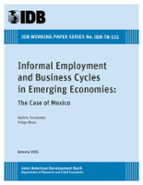Informal Employment and Business Cycles in Emerging Economies: The Case of Mexico
Date
Jan 2015
This paper documents how informal employment in Mexico is countercyclical, lags the cycle and is negatively correlated to formal employment. This contributes to explaining why total employment in Mexico displays low cyclicality and variability over the business cycle when compared to Canada, a developed economy with a much smaller share of informal employment. To account for these empirical findings, a business cycle model is built of a small, open economy that incorporates formal and informal labor markets, and the model is calibrated to Mexico. The model performs well in terms of matching conditional and unconditional moments in the data. It also sheds light on the channels through which informal economic activity may affect business cycles. Introducing informal employment into a standard model amplifies the effects of productivity shocks. This is linked to productivity shocks being imperfectly propagated from the formal to the informal sector. It also shows how imperfect measurement of informal economic activity in national accounts can translate into stronger variability in aggregate economic activity.




